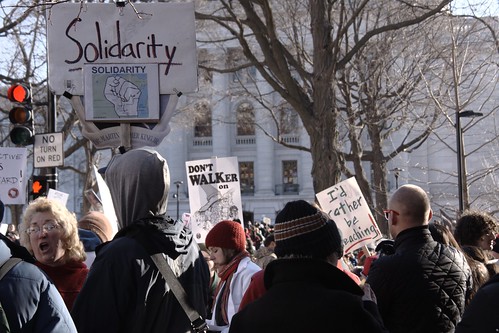
Yesterday Anna Paretskaya presented a report on the political standoff in Madison Wisconsin. This stimulated comments by Michael Corey and Iris, the first generally critical of Paretskaya’s presentation and analysis, the second supportive. This evening, Chad Alan Goldberg, Vice President, United Faculty & Academic Staff (UFAS), AFT 223 and Associate Professor of Sociology at the University of Wisconsin-Madison offered his analysis in a reply to that discussion, which I think requires deliberate consideration as a post of its own. -Jeff
1. Dr. Corey suggests that Anna Paretskaya’s account of events here in Wisconsin is insufficiently objective and lacks a “suspension of belief.” To be sure, knowledge of the social world is always socially situated. Those of us with backgrounds in the labor movement–those of us who are public employees, like Anna and myself, whose collective bargaining rights are now threatened in Wisconsin–are indeed likely to see things differently than someone, like Dr. Corey, with a background in corporate management. However, the tradition of critical theory suggests the possibility of another kind of relationship between the observer and the events she observes. As Max Horkheimer put it, “If … the theoretician and his specific object are seen as forming a dynamic unity with the oppressed class, so that his presentation of societal contradictions is not merely an expression of the concrete historical situation but also a force within it to stimulate change, then his real function emerges…. His profession is the struggle of which his own thinking is a part.”
2. Much of Dr. Corey’s comment lays out the differing claims of the social and political actors in Wisconsin in a “he said, she said” manner without making any real attempt to investigate the substance of those claims. As social scientists, we are interested in facts. And the facts are on the side of the tens of thousands of protesters gathering day after day at the Wisconsin state capitol.
a. Corporate-funded right-wing propagandists insist that public employees are a new privileged class which taxpayers can’t afford. However, as the Wisconsin State Journal reported, a new study by the . . .
Read more: Workers’ Rights and Democracy in Madison


